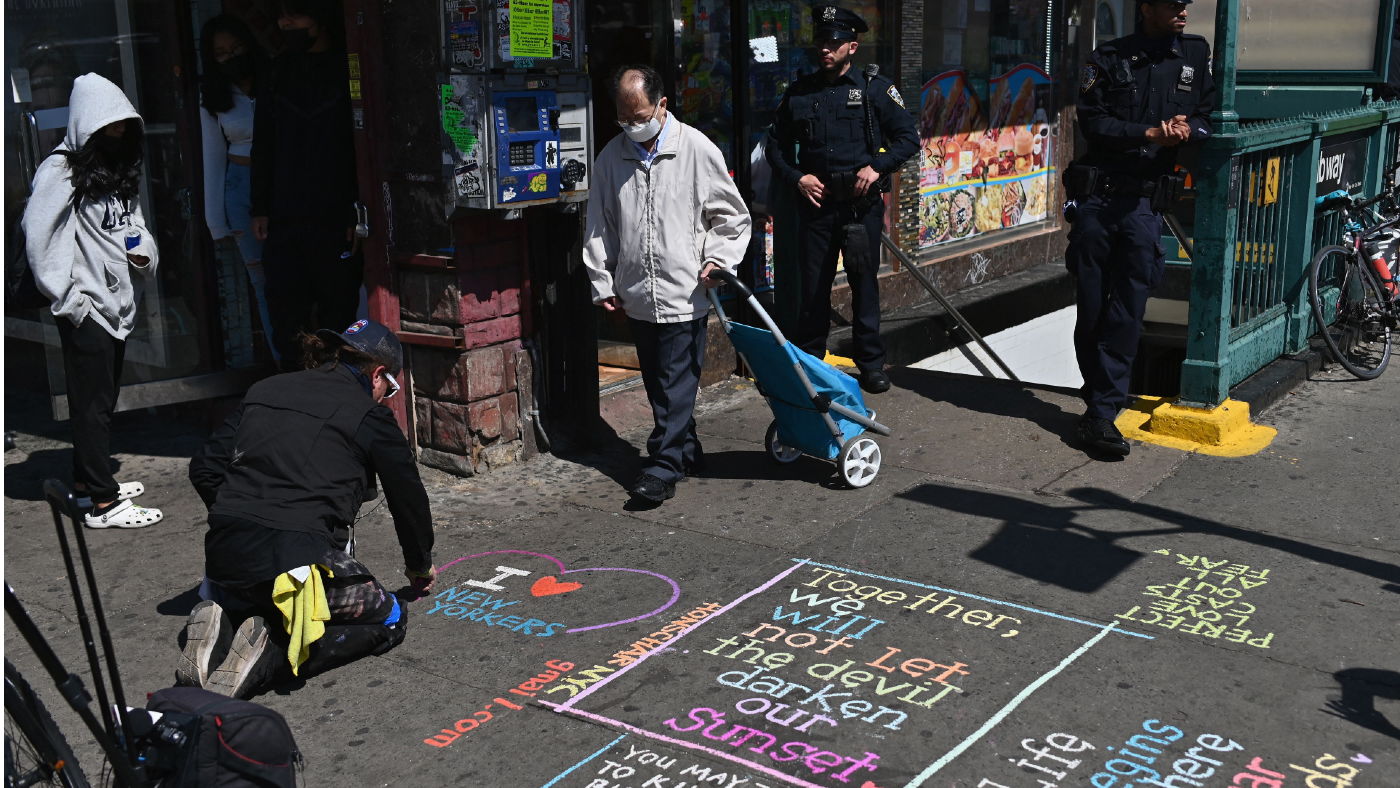Why are domestic violence rates increasing?
Femicide Census finds number of women killed by men is at highest level yet

A free daily email with the biggest news stories of the day – and the best features from TheWeek.com
You are now subscribed
Your newsletter sign-up was successful
More than half the women killed by men in the UK in 2018 were killed by a current or former partner, says a new report.
Only 6% of such murders were committed by a stranger.
What does the report say?
The Week
Escape your echo chamber. Get the facts behind the news, plus analysis from multiple perspectives.

Sign up for The Week's Free Newsletters
From our morning news briefing to a weekly Good News Newsletter, get the best of The Week delivered directly to your inbox.
From our morning news briefing to a weekly Good News Newsletter, get the best of The Week delivered directly to your inbox.
The fourth Femicide Census found that 149 women were killed by 147 men in the UK in 2018. The total represents an increase of 10 on the 2017 figure and is the highest since the census began.
Of the deceased women, 91 (61%) were killed by a current or former partner. The majority of killings (68%) happened either in or immediately around the woman’s house.
Of the 58 who were not killed by current or former partners, 12 were killed by their sons or stepsons and five were killed by a son-in-law or former son-in-law.
In half the cases, the male killers had histories of violence against women, often including the victim.
A free daily email with the biggest news stories of the day – and the best features from TheWeek.com
Three of the men had killed before, with one convicted of manslaughter in 1996 and imprisoned for just three years. Another, with a history of stalking, was released from prison in 2014 after killing his previous partner in 1999. The third had been convicted of serious violent offences in 2001 and 2010, and had been convicted of culpable homicide in 1992, says The Guardian.
Karen Ingala Smith, who runs the domestic violence charity Nia and co-founded the census, said the women had often given warnings and spoken of their fear of their killer to police, services, and friends and family.
Of the women killed in 2018, 41% of those murdered by a current or former partner had left or were killed during the process of leaving that partner.
“It’s important that we challenge received wisdom about seeing leaving a violent relationship being a straightforward way that women can remove themselves from the danger of a violent partner,” Ingala Smith said.
The report also found that “overkilling” – using gratuitous violence beyond that necessary to cause the victim’s death – took place in 56% of cases.
“In one femicide, the post-mortem carried out on the victim established that most of the 70-plus stab wounds inflicted were very shallow, indicating a high degree of control and suggesting the perpetrator’s intent to torture the victim before inflicting the fatal wounds,” the report said.
Ingala Smith wrote on Twitter that she was “hurting for all the women killed, the people who loved them and those living with violence”.
Is domestic abuse on the rise?
The number of domestic abuse crimes is hard to tally, because it is a crime that is often hidden and not reported to police.
According to statistics published by domestic abuse charity Living Without Abuse, domestic violence will affect one in four women in their lifetime.
The most recent figures from the Office for National Statistics show that an estimated 5.7% of adults (2.4 million) experienced domestic abuse in the year to March 2019.
“Data held by the police can only provide a partial picture of the actual level of domestic abuse experienced,” says the ONS. “Many cases will not enter the criminal justice process as they are not reported to the police.”
ONS figures show that despite a rise in domestic abuse of 24% in a year, referrals of cases from the police to the Crown Prosecution Service fell by 11%.
Sarika Seshadri, from the domestic abuse charity Women’s Aid, told The Independent: “The data shows domestic abuse is persistently high. The fall in cases being referred to the CPS is very troubling – especially when we know how difficult it is to come forward. Women need to know when they come forward that these cases are dealt with effectively.
“Domestic abuse is such a devastating crime, the women who experience it lose everything: their home, their freedom, their dignity and ultimately their lives.”
You do not have to wait for an emergency situation to find help. For information on where to receive confidential, non-judgemental information and support, visit the NHS web page on domestic violence and abuse.
-
 Political cartoons for February 22
Political cartoons for February 22Cartoons Sunday’s political cartoons include Black history month, bloodsuckers, and more
-
 The mystery of flight MH370
The mystery of flight MH370The Explainer In 2014, the passenger plane vanished without trace. Twelve years on, a new operation is under way to find the wreckage of the doomed airliner
-
 5 royally funny cartoons about the former prince Andrew’s arrest
5 royally funny cartoons about the former prince Andrew’s arrestCartoons Artists take on falling from grace, kingly manners, and more
-
 Dash: the UK's 'flawed' domestic violence tool
Dash: the UK's 'flawed' domestic violence toolThe Explainer Risk-assessment checklist relied on by police and social services deemed unfit for frontline use
-
 The manosphere: the shady online network of masculinists
The manosphere: the shady online network of masculinistsThe Explainer A new police report said a rise in radicalised young men is contributing to an increase in violence against women and girls
-
 Irish flight attendant breaks silence after 'distressing' Dubai charges dropped
Irish flight attendant breaks silence after 'distressing' Dubai charges droppedSpeed Read Tori Towey was charged with attempted suicide and consuming alcohol after being attacked in her home
-
 What we know about the Copenhagen mall shooting
What we know about the Copenhagen mall shootingSpeed Read Lone gunman had mental health issues and not thought to have terror motive, police say
-
 Texas school shooting: parents turn anger on police
Texas school shooting: parents turn anger on policeSpeed Read Officers had to be urged to enter building where gunman killed 21 people
-
 DJ Tim Westwood denies multiple sexual misconduct allegations
DJ Tim Westwood denies multiple sexual misconduct allegationsSpeed Read At least seven women accuse the radio and TV presenter of predatory behaviour dating back three decades
-
 What happened to Katie Kenyon?
What happened to Katie Kenyon?Speed Read Man charged as police search for missing 33-year-old last seen getting into van
-
 Brooklyn subway shooting: exploring New York’s ‘steep decline in law and order’
Brooklyn subway shooting: exploring New York’s ‘steep decline in law and order’Speed Read Last week, a gunman set off smoke bombs and opened fire on a rush-hour train in the city